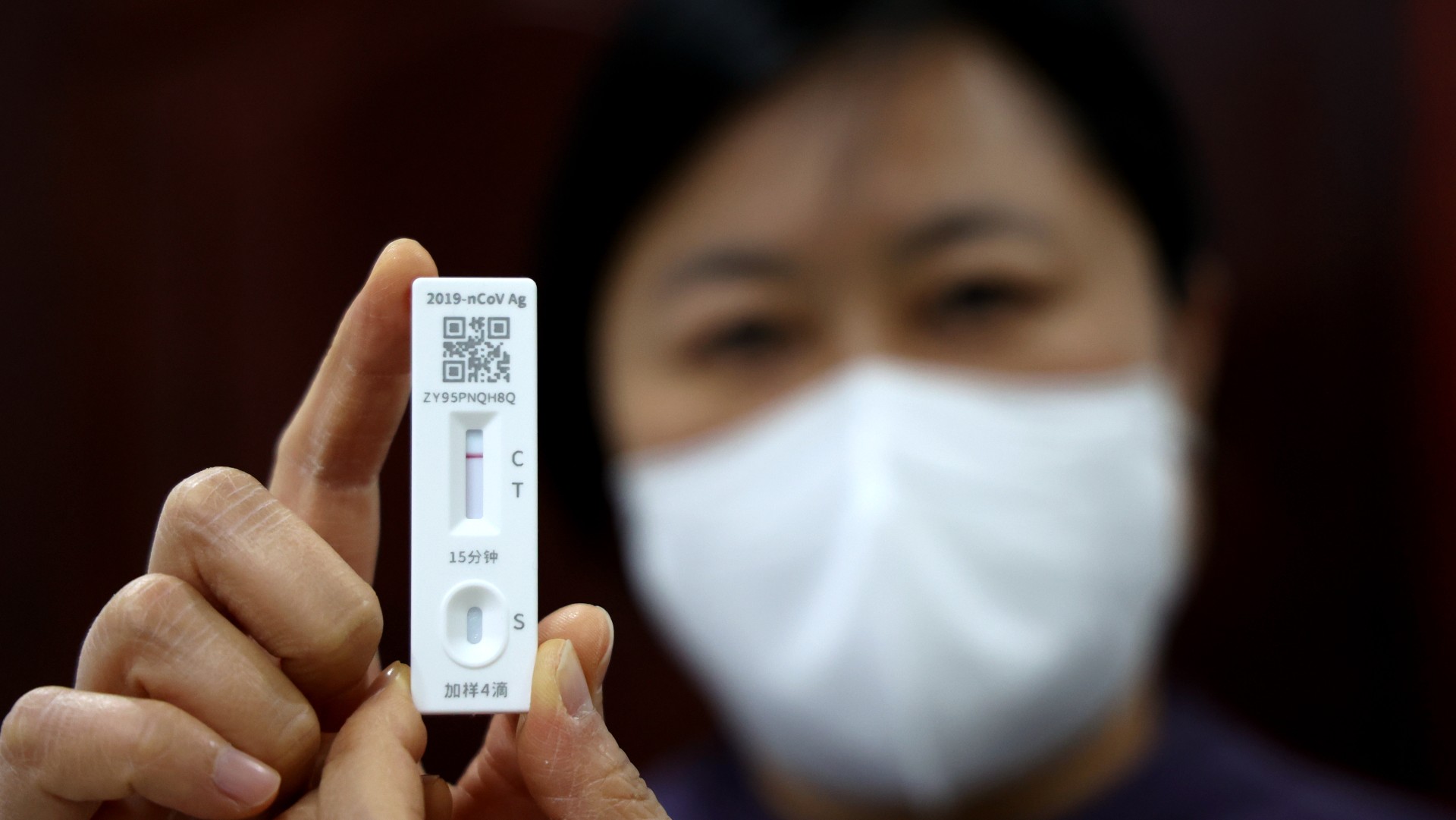Will China’s three winter waves of Covid have global impact?
Supply chain chaos and unease at international travel could prove ‘shortlived’ as country finally opens up after three years

A free daily email with the biggest news stories of the day – and the best features from TheWeek.com
You are now subscribed
Your newsletter sign-up was successful
China’s sudden U-turn on its strict “zero-Covid” policy has led to concern that surging coronavirus cases could cause more than a million deaths next year as well as widespread disruption to global supply chains just as the world faces an economic downturn.
Following unprecedented protests at the country’s draconian Covid restrictions, Beijing made a surprise announcement earlier this month that it would “optimise” its policies by allowing mild cases to quarantine at home, as well as limiting lockdowns, scrapping mass testing and lifting curbs on domestic travel.
“China’s scrapping of its Zero Covid policy is viewed by some as a pragmatic step aimed at reviving economic growth” said Forbes, “but, in the short term it may backfire by exacerbating already existing supply chain and labour shortage issues”. As the world’s largest producer and exporter of consumer goods, “disruptions across the Chinese manufacturing sector are likely to impact the global supply chain of goods and the world’s economy as a whole”.
The Week
Escape your echo chamber. Get the facts behind the news, plus analysis from multiple perspectives.

Sign up for The Week's Free Newsletters
From our morning news briefing to a weekly Good News Newsletter, get the best of The Week delivered directly to your inbox.
From our morning news briefing to a weekly Good News Newsletter, get the best of The Week delivered directly to your inbox.
With three Covid waves predicted to rip through China between now and the spring, the impact of the virus on the number of fatalities, business and international travel is undoubtedly going to be severe even if, as many hope, it is relatively short-lived as the country finally opens up after more than three years.
What did the papers say?
“Despite rampant illness – nearly everyone here has a cough or fever – the sense of relief is palpable,” reported The Telegraph. There is a growing acceptance that China needs to learn to live with the virus as people in Europe did last year.
“But the sudden removal of all containment measures has made some experts jittery,” said the paper. “Large numbers of people are now sick and hospitals have been overwhelmed with an influx of new patients, with the capital, Beijing, at the centre of the latest wave.”
Having adopted a policy of containment ever since Covid-19 first emerged exactly three years ago, “many of China’s 1.4 billion people remain vulnerable to the virus because of limited exposure, low vaccination rates and poor investment in emergency care”, said The Washington Post.
A free daily email with the biggest news stories of the day – and the best features from TheWeek.com
According to new projections from the US-based Institute of Health Metrics and Evaluation (IHME) reported by Reuters, China could experience over a million Covid-related deaths next year. Official pandemic fatalities currently stand at around 6,000.
“It’s becoming increasingly hard to get a handle on the scale of China’s Covid-19 onslaught,” said Bloomberg. For now “the severity of China’s coronavirus surge is being reported largely anecdotally, with stories of deserted streets, strained hospitals and funeral homes, and pharmacies being emptied of fever medication and traditional remedies”, added The Washington Post.
Ominously, Radio Free Asia has reported that funeral homes in and around Beijing are operating around the clock amid the spike in cases, with cremations now backed up for at least five days.
What next?
China is forecast to face three waves of Covid between now and mid-March, according to CGTN.
Many office workers have begun to work from home causing “widespread business disruption as staffing shortages threaten to close down factory production lines and truck drivers fall ill, bringing chaos to supply chains”, said the Financial Times.
In a worrying sign that the surge in cases is already having an impact, China’s business confidence fell to its lowest since January 2013, a survey by World Economics showed on Monday, according to Reuters.
However, “there is some evidence that the disruption will be shortlived”, reported the FT, with Apple contract manufacturer Foxconn’s Zhengzhou facility, the world’s largest iPhone factory, among those shedding its strict restrictions.
Factories could face worker shortages until February after the lunar new year, claimed the paper. “However, investors are hoping that the period of short-term disruption will accelerate China’s opening up, after three years of being isolated from the rest of the world.”
Chen Long, a partner at the Beijing-based research provider Plenum, said: “Investors will look through this period of short-term mess. The crucial question is how quickly things will normalise after this wave, and it looks like it could be much faster than expected.”
While there are also early signs of a rebound in domestic travel, continued public nervousness over long-haul flights “could pose a challenge to the international tourism market’s nascent recovery from the pandemic, which has been held back by China’s ongoing border closures”, said Al Jazeera.
In a survey of 4,000 Chinese consumers carried out by consultancy Oliver Wyman in late October, more than half of respondents said they planned to put off travel abroad, even if the borders reopened tomorrow.
In 2018 China’s population spent $288bn on international travel, nearly one-quarter of the global spending on tourism.
The other “big unknown”, said Forbes, “is how, from a public health perspective, the situation in China affects the pandemic outside of China”, increasing the likelihood of new mutations or variants, “all with potentially greater immune-escape properties and a higher reproduction number”.
When asked last week how the rise in cases may impact global inflation levels, US Federal Reserve chairman Jerome Powell said it could cut both ways. If China’s economy slows down, that could actually lower oil and gasoline prices around the world, he argued. But if the outbreak causes new tangles in supply chain, that could make inflation worse.
“It’s really a no-win situation,” said NPR’s chief economics correspondent Scott Horsley. “US companies were already feeling the effects of China’s strict Covid prevention policies. Now they could feel the fallout from relaxing those policies. Of course, a lot will depend on the severity of the outbreak and how long it lasts.”
-
 The ‘ravenous’ demand for Cornish minerals
The ‘ravenous’ demand for Cornish mineralsUnder the Radar Growing need for critical minerals to power tech has intensified ‘appetite’ for lithium, which could be a ‘huge boon’ for local economy
-
 Why are election experts taking Trump’s midterm threats seriously?
Why are election experts taking Trump’s midterm threats seriously?IN THE SPOTLIGHT As the president muses about polling place deployments and a centralized electoral system aimed at one-party control, lawmakers are taking this administration at its word
-
 ‘Restaurateurs have become millionaires’
‘Restaurateurs have become millionaires’Instant Opinion Opinion, comment and editorials of the day
-
 A Nipah virus outbreak in India has brought back Covid-era surveillance
A Nipah virus outbreak in India has brought back Covid-era surveillanceUnder the radar The disease can spread through animals and humans
-
 Is the US about to lose its measles elimination status?
Is the US about to lose its measles elimination status?Today's Big Question Cases are skyrocketing
-
 Covid-19 mRNA vaccines could help fight cancer
Covid-19 mRNA vaccines could help fight cancerUnder the radar They boost the immune system
-
 Is this the end of ultraprocessed foods?
Is this the end of ultraprocessed foods?Today's Big Question California law and the MAHA movement are on the same track
-
 Can TrumpRx really lower drug prices?
Can TrumpRx really lower drug prices?Today’s Big Question Pfizer’s deal with Trump sent drugmaker stocks higher
-
 The new Stratus Covid strain – and why it’s on the rise
The new Stratus Covid strain – and why it’s on the riseThe Explainer ‘No evidence’ new variant is more dangerous or that vaccines won’t work against it, say UK health experts
-
 RFK Jr. vaccine panel advises restricting MMRV shot
RFK Jr. vaccine panel advises restricting MMRV shotSpeed Read The committee voted to restrict access to a childhood vaccine against chickenpox
-
 RFK Jr. scraps Covid shots for pregnant women, kids
RFK Jr. scraps Covid shots for pregnant women, kidsSpeed Read The Health Secretary announced a policy change without informing CDC officials